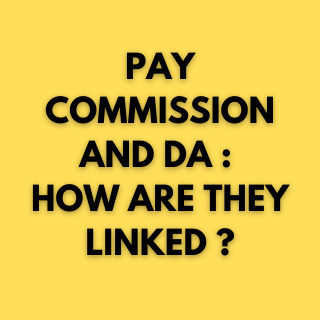
Pay Commission and DA: How Are They Linked?
Introduction
When it comes to government employees’ salary structures, two terms frequently emerge: Pay Commission and Dearness Allowance (DA). While both play crucial roles in determining salaries, understanding how they are linked is key for employees and policymakers alike. This article dives deep into the connection between Pay Commission and Dearness Allowance, explaining their significance and impact.
What Is a Pay Commission?
A Pay Commission is a government-appointed body that reviews and recommends changes to the salary structure of public sector employees.
- Objective: Ensure fair and competitive pay.
- Frequency: Established every 10 years (e.g., 6th, 7th Pay Commission).
- Components Evaluated:
- Basic Pay.
- Allowances (like DA).
- Pension and retirement benefits.
What Is Dearness Allowance (DA)?
Dearness Allowance (DA) is a cost-of-living adjustment allowance paid to employees to counter inflation.
- Purpose: Protect employees’ purchasing power against rising prices.
- Calculation:
- Linked to the Consumer Price Index (CPI).
- Expressed as a percentage of the basic pay.
- Types:
- DA for Central Government Employees.
- DA for State Government Employees.
The Link Between Pay Commission and DA
The Pay Commission directly impacts DA in several ways:
1. Revision of Basic Pay
- Every Pay Commission recommends a revision of basic pay.
- DA, being a percentage of basic pay, increases or decreases proportionally.
2. DA Merger with Basic Pay
- When DA crosses a certain threshold (usually 50%), it may be merged with the basic pay as recommended by the Pay Commission.
- This merger leads to an increase in the total salary and impacts future DA calculations.
3. Changes in DA Formula
- Pay Commissions may recommend adjustments to the DA calculation formula based on economic conditions.
- Example: The 7th Pay Commission introduced a simplified DA formula based on CPI-IW (Consumer Price Index for Industrial Workers).
Impact of Pay Commission on Dearness Allowance Rates
1. Increased Take-Home Salary
- A higher basic pay means employees receive a higher DA percentage in absolute terms.
- Example: Transition from 6th to 7th Pay Commission resulted in a steep DA hike due to revised pay scales.
2. Delay in DA Announcements
- The government might delay DA announcements during the implementation phase of a new Pay Commission, impacting cash flow for employees.
3. Retirement Benefits
- Revisions directly impact post-retirement benefits because they calculate pensions as a percentage of basic pay and DA
Recent Trends in Pay Commission and Dearness Allowance
1. 7th Pay Commission Highlights
- Increased minimum pay to ₹18,000.
- Simplified the DA calculation formula.
- DA currently revised semi-annually based on CPI-IW.
2. Current DA Rates for Central Employees (2024)
- Latest DA rate: 53% of basic pay (as of October 2024).
- Expected increase in DA following inflation trends.
3. Speculation About 8th Pay Commission
- While no official announcements have been made, discussions about the next Pay Commission are underway. Click here to know about the expectations of 8th pay commission
How DA Protects Against Inflation
- The Consumer Price Index (CPI) serves as a benchmark for calculating DA.
- Regular DA hikes ensure employees’ income keeps pace with rising living costs.
- Example: During periods of high inflation (e.g., 2020-2021), DA hikes cushioned employees from economic shocks.
Conclusion
The relationship between Pay Commission and Dearness Allowance (DA) is symbiotic. While the Pay Commission sets the foundation by revising basic pay scales, DA ensures employees remain financially secure in the face of inflation. Together, they create a balanced and sustainable salary structure for government employees.
Are you curious about upcoming DA hikes or the next Pay Commission? Check Central Government Employees News to stay updated on all government salary revisions!
FAQs
1. How often is DA revised?
DA is revised twice a year, usually in January and July.
2. Can DA be reduced?
Yes, DA may decrease if inflation levels drop, although this is rare.
3. What happens to Dearness Allowance during Pay Commission transitions?
During Pay Commission transitions, DA may be merged with the revised basic pay.
4. Is DA taxable?
Yes, Dearness Allowance is fully taxable under income tax laws.
Informations provided here are only for informative purpose. Check Official Pay Commission Website once.
Leave a Reply